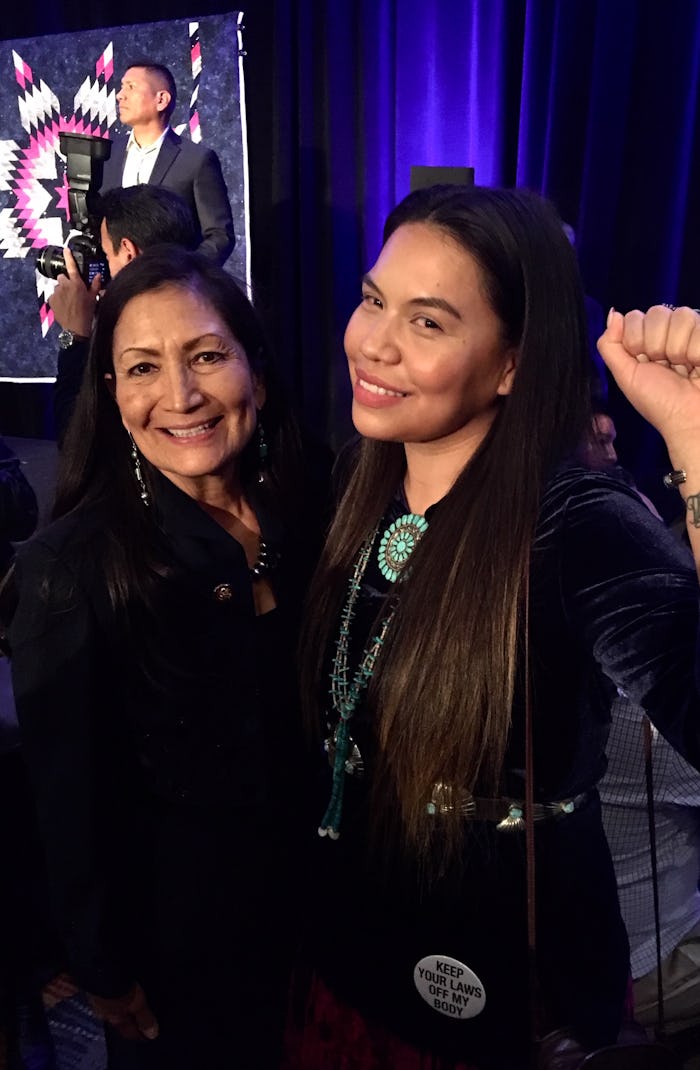Life

What It Was Like To Be In The Room, Celebrating The Women Who Represent Me At Last
Thursday night, for the very first time — at 32 years old — I walked into a room filled with hundreds of people who looked just like me. I had never felt more at home. The sound of drums beating made me feel like my heart was going to jump out of my chest; each beat resonated so deep inside my spirit. It was hard to stop the tears from flowing. I was filled with so many emotions: intense happiness, pride, joy, and even sadness. I have always been the odd woman out, not easily identifiable... just the mixed “exotic” sidekick. Never out of place but never one of “them." To look around at this reception honoring the first Native congresswomen, Deb Haaland and Sharice Davids, and see Indigenous peoples from all tribes across the United States coming together in our nation's capital to bear witness to such a long overdue and historic event, was a moment I will never forget.
The night was special for many reasons. Originally, the reception was meant to be held at the National Museum of the American Indian (the Smithsonian in D.C.), but because of the government shutdown it was switched at the last minute to the Hyatt Regency Capitol Hill. Attended by tribal leaders from across the U.S., native people working in the D.C. area, and members of both congresswomen's teams, the reception was essentially a celebration in honor of the swearing-in which happened earlier that day. But it was so much more than that. Being an Indigenous woman and mother, I saw the past and future collide into a beautiful celebration of representation and promise. We finally have our voices: two strong intelligent Indigenous women who will fight for my daughter and me by demanding acknowledgment and action: Congresswoman Debra Haaland, an attorney and member of the Laguna Pueblo tribe; and Congresswoman Sharice Davids, a lawyer and member of the LGBT community and the Ho-Chunk Winnebago Nation.
Both women are prime examples of Indigenous resilience and female perseverance.
A single mother, Deb Haaland was raised in a military family and raised her child while pursuing higher education and a career in law. She worked on the Obama reelection campaign while supporting her amazing daughter, Somah Haaland, who came out as a lesbian to her during that campaign. Congresswoman Haaland has been her daughter's biggest inspiration and advocate. (I got to speak with Somah for a few minutes at the event, and she could not stress how much her mother's unwavering support has made her who she is today.)
Sharice Davids, for her part, was raised by a single mother army veteran and is openly part of the LGBT community, as well as an all around badass MMA fighter who has lived on Native American reservations working with tribes to create economic development opportunities, programs, and initiatives. Both women are prime examples of Indigenous resilience and female perseverance.
Perhaps most importantly, all women are leaders, mothers, and sisters; no one is disconnected. I look to the congresswomen as peers, as mothers, and as sisters, because that "village" mentality holds true to our core values as Indigenous people.
The female role in many Native American cultures transcends modern labels that women are given. For example, in my Navajo culture, it is first a matriarchy and the women fulfill all roles; my "aunts" are also my mothers (they hold the same status as my mother would and also bear the same responsibility to co-raise and lead). My cousins are my siblings. Perhaps most importantly, all women are leaders, mothers, and sisters; no one is disconnected. I look to the congresswomen as peers, as mothers, and as sisters, because that "village" mentality holds true to our core values as Indigenous people.
These women fought for representation and are now paving a path for my daughter and myself that was not there before.
Within the current movement for inclusion, Indigenous peoples are still a forgotten group, usually only mentioned when environmental issues arise. Just like any other minority group, we face a multitude of challenges that can only be addressed through representation. When our very own President explains away this country's history of genocide and the attempted extermination of its Indigenous inhabitants as his ancestors' way of “taming a continent,” there is no better time than now to fight. Indigenous representation in Congress will take our Native communities out of the history books and tell the United States that we are still here and we are untamed.
Debra Haaland and Sharice Davids represent so much more that just the first female Indigenous US congresswomen. They represent decades of broken treaties and silenced voices; generations of smoke and prayers and Indigenous resilience. These women fought for representation and are now paving a path for my daughter and myself that was not there before. As I go about my everyday “mom” routine (working from home, cooking, cleaning, smashing the patriarchy, etc.), I can’t help but feel a hope that wasn't there before. With tears in my eyes, I looked at my almost 5-year-old and said “You could be the president one day, you know that?” And I believed it.
After experiencing a traumatic c-section, this mother sought out a doula to support her through her second child’s delivery. Watch as that doula helps this mom reclaim the birth she felt robbed of with her first child, in Episode Three of Romper's Doula Diaries, Season Two, below. Visit Bustle Digital Group's YouTube page for more episodes.